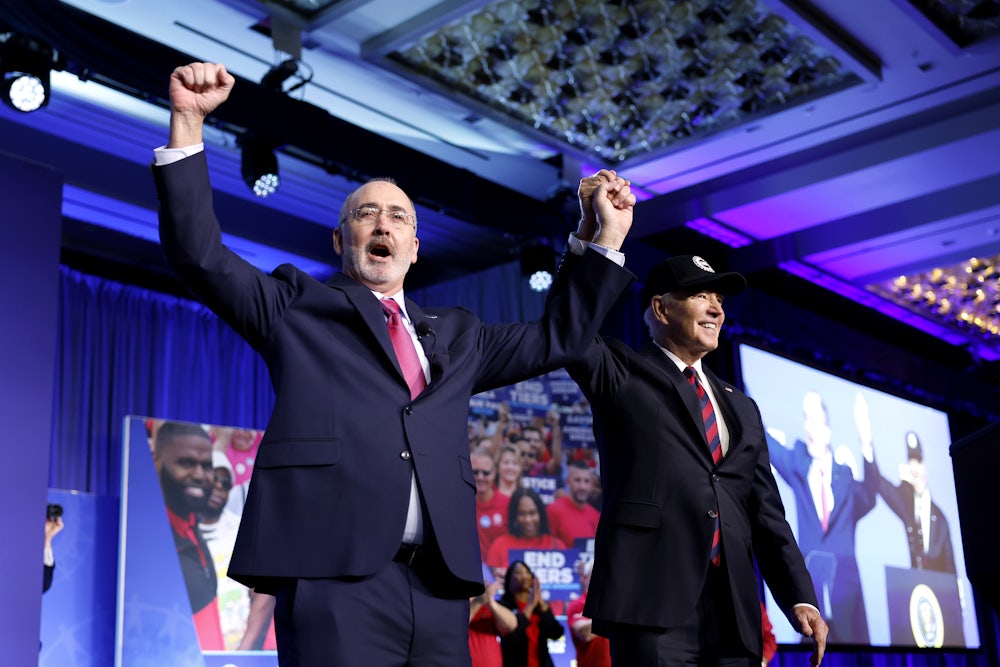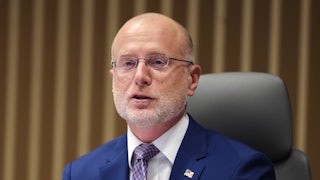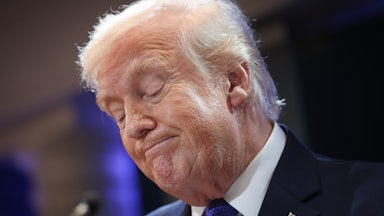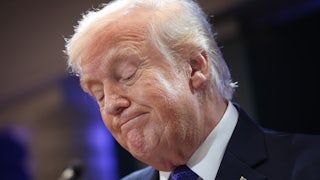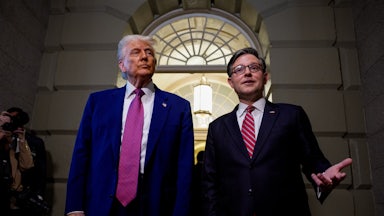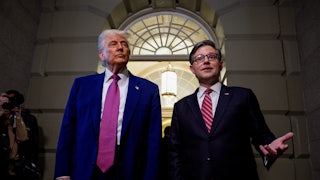In 2016, I went to the polls with the intention of holding my nose and voting for Hillary Clinton. I was told that the election (my first) would be the most important one in my lifetime, that a Republican victory represented an existential threat to our democracy, that to sit it out or vote third-party was a clear vote for Donald Trump. I was in disbelief over the choices in front of me but resigned to the fact that voting in the United States wasn’t about whom the majority of voters wanted to lead, so much as a four-year obligation to prevent the greater evil from taking over.
Eight years later, as the Democratic Party scrambles to find a viable replacement for President Biden and weighs the options among Vice President Kamala Harris, who trails behind Trump in head-to-head polls, and a list of pre-vetted party insiders, I feel a vertigo-inducing sense of déjà vu. Remarks Clinton made in April about Biden’s candidacy ring bitter in my ear: “Get over yourself. Those are the two choices.” It was precisely this condescending tone and line of thinking that led to her shocking defeat in 2016. Today we’re at risk of repeating the same fatal mistake.
To those who’ve stated that they’d vote for Biden even if he were in a coma, I have this to say: We can and must do better. Voters will not be inspired to turn out to the polls because our candidate has a pulse. Our democracy thrives on the strength of our collective imagination. We need to cultivate a national dialogue centered on hope, possibility, and the belief that we can build a more just and prosperous future together. We have to imagine what can be, unburdened by what has been.
We should not settle for the expected, but strive for the exceptional: a leader who embodies our collective dreams and aspirations. There is only one person in my mind who fits this bill, and it’s Shawn Fain, president of the United Auto Workers union. After leading nearly 150,000 workers in their historic “stand up” strike against the Big Three automakers, Fain now serves as the clearest embodiment of the democratic project to rebuild the middle class and reinvigorate American manufacturing.
Fain, I must disclose, is not just someone I admire deeply on a personal level. My husband serves as outside counsel to the UAW and acted as a negotiator during bargaining with the Big Three—a landmark labor victory that won 25 percent wage increases, cost-of-living adjustments, expanded retirement benefits, and a tangible path toward a green energy future. But this personal connection has only allowed me to see more closely what an impressive person Fain is. Should Fain be given a shot at national office, I’m confident he would replicate these successes on a much larger scale.
Fain’s outlook on life is shaped by his working-class background. He was born and raised in Kokomo, Indiana, to a nurse and the city’s chief of police. He’s the grandson of two UAW members and has served extensively in his local, as shop chairman, as a skilled trades committeeman, and as an international representative for the union. In 2009, Fain helped organize protests against Chrysler plant closures and served as a national negotiator for the union during the company’s bankruptcy proceedings. The 55-year-old populist, who begins each day by reading the Bible (as opposed to hawking them), carries his grandfather’s pay stub with him as a reminder of where he came from. He’s a lifelong union member who worked his way up to becoming the face of a revitalized labor movement after decades of declining union density, stagnant wages, and spiraling wealth inequality.
In March 2023, Fain won the UAW’s first direct election for union leadership by fewer than 500 votes against the incumbent president, Ray Curry, a member of an old-guard caucus that exercised total control over the union for roughly 70 years. Fain ran with Unite All Workers for Democracy, a reform caucus advocating for greater transparency in the face of the union’s nasty corruption scandal, more robust rank-and-file engagement, and a more aggressive approach to bargaining. Fain was sworn into office on his grandmother’s Bible.
Fain is certainly an anti-Trumper. “If Donald Trump ever worked in an auto plant, he wouldn’t be a UAW member, he would be a company man trying to squeeze the American worker,” Fain said during his endorsement of Biden in January. He remains steadfast in his backing of Biden’s presidential campaign. But I believe someone needs to take it upon themselves to make his case, if only to open our collective imaginations and break us out of our panic-stricken state.
A resounding 75 percent of Americans across the political spectrum supported striking autoworkers during the UAW’s 2023 strike, suggesting a broad appeal that could win over swing voters and those disillusioned by establishment politics. Fain has made good on his promise to “take on the billionaire class” and speaks to the deep economic pain that plagues our nation. He’s championing a four-day workweek with no loss in pay and has taken a “bargaining for the common good” approach to organizing and negotiations to fight for all U.S. workers, not just those in the industries he represents.
If he were the candidate, he’d have the advantage of being able to secure the support of organized labor and would likely win a landslide victory in the key state of Michigan, home to the union’s Detroit headquarters. In contrast to Trump’s anti-trade agenda and record of factory closures, Fain was able to negotiate the reopening of a shuttered Stellantis plant in Belvidere, Illinois, and a $3.2 billion investment in a new electric vehicle battery manufacturing facility in Kokomo. In contrast to Trump’s hateful rhetoric and policies toward Mexico, the UAW has launched a solidarity project to support Mexican autoworkers in their struggle against a common enemy.
Since December, the UAW has been calling for a cease-fire in Gaza and has created a Divestment and Just Transition Committee to look into the union’s economic ties to the Israel-Palestine conflict and explore a “just transition for U.S. workers from war to peace.” In doing so, the UAW is presenting an exciting alternative foreign policy vision that members of both parties have been hungry for.
I know you’re thinking that this is totally unrealistic, and perhaps it is. But if there’s one thing we can learn from European elections, it’s the need for the center-left and center-right to put aside their differences and unite behind a strong candidate in the face of a dangerous far-right coalition. As Jon Stewart recently pointed out on The Daily Show, France and the U.K. held their elections in a matter of weeks, adding, “Four months is for-fucking-ever.… There are contestants on The Bachelor, who haven’t even met yet, that will get married and divorced between now and the election. We have nothing but time.”
Should Fain at any point become interested in running for president, be it in 2024 or 2028, he should know that he has a generation of younger voters behind him waiting to pick up where the Bernie Sanders campaign left off. (The UAW represents over 100,000 academic workers across the nation and more graduate students than any other union.) I’d add that we’re all having a miserable time, and we really need someone who inspires hope and change in this moment.
Fain is a nationally recognized ally of the Biden administration who sits sufficiently outside of the party to excite voters who are tired of the status quo. In many respects, Fain is the perfect candidate to carry on Biden’s economic legacy. Biden vowed to be the most pro-union president in history and made good on that promise. In September, Biden became the first sitting president to walk a picket line when he joined Fain at an old Ford factory in Michigan that used to make B-24 bombers during World War II. Fain referred to the site as the “arsenal of democracy” and railed against the billionaire class: “They think they own the world, but we make it run.”
In his 2024 State of the Union address, Biden referred to Fain as “a great friend, and a great labor leader,” and emphasized one of the core beliefs of his administration: “The middle class built this country! And unions built the middle class!”
In an era where political cynicism is rampant and trust in institutions is waning, approval ratings for unions are at the highest they’ve been since 1965. The Democratic Party has a unique opportunity to present a candidate who embodies the common good. A Fain presidency would signal a return to the party’s roots. Amends for the Democrats’ historical betrayal of organized labor.
However, I don’t believe Biden can just hand the election to a new nominee after running noncompetitive primaries and spending months avoiding the national media. Nor do I think Fain should run an insurgent presidential campaign without Biden’s blessing. I’m confident Fain would be a strong candidate in a “blitz primary,” an idea proposed by Rosa Brooks, a Georgetown Law professor who served in the Obama and Clinton administrations, and Ted Dintersmith, a philanthropist, venture capitalist, and democratic donor.
Brooks and Dintersmith’s memo imagines a process whereby Biden would step down in mid-July and open the race to other candidates who would compete in a “primary sprint” that would involve viral outreach with the help of figures like Michelle Obama and Taylor Swift. Delegates would then select a candidate through ranked-choice voting at the convention in August, where the final nominee would be presented by Biden, Barack Obama, and Bill Clinton. Brooks and Dintersmith write that “Democrats can make this Our Finest Hour” or “limp to shameful, avoidable democracy-ending defeat.”
When I got into the booth in 2016 and saw Hillary Clinton’s name on the ticket, I felt a knot in my stomach and did something I thought I had talked myself out of: I voted for Jill Stein. In the days following the election, I agonized over my decision, particularly since I made it with the expectation that Clinton would lose the race. In deep blue Brooklyn (I was living in Hakeem Jeffries’s congressional district at the time), I rationalized my choice by telling myself that it would likely come down to the Electoral College, and if the voters in those crucial margins were not convinced, it was no one’s fault but her own. The party ran a losing candidate because they felt it was “her time,” and chose to listen to the polls over the disgruntled voices of their own base. Today, we don’t even have a lead in the polls. Today, Manhattan Borough President Mark Levine, a Democrat, is calling New York a “battleground state.”
I voted for Stein because I believed, as I still do, that we always need a few strong outside voices who demand that we collectively dream bigger. To chart a path to a future where we have something to vote for, and not against. “As long as I gave it my all,” as Biden put it to George Stephanopoulos, is not an answer to the very real threat of fascism we now face. Similarly, you cannot run as the democracy candidate and then hand the nomination off at the very last minute and expect voters to feel like their voices have been heard.
Biden ran in 2020 on his electability and has left a legacy that he can be proud of. But today, a sizable chunk of the American public, the national media, and party insiders alike are telling him he is no longer that candidate. If those who are serious about defeating Donald Trump lose this election in November, it will be the fault of the Democratic Party, not the voters.
Biden has stated clearly that he is unwilling to leave the election. He appears poised to drag us into the worst-case scenario: too late to pivot to another candidate and unable to convince the public that his true mission in staying in the race is to defeat Trump. The proposal above depends on Biden realizing that this is his choice alone to make, and it must be made soon.
Should Biden do what is expected of him and pass the torch to Kamala Harris, or should she be selected through a blitz primary or a similar open process—a proposal even Representative Jim Clyburn has gotten behind—she would be wise to consider Fain as her running mate.
In the meantime, it appears as though the fate of our republic remains in the hands of the Lord Almighty.
